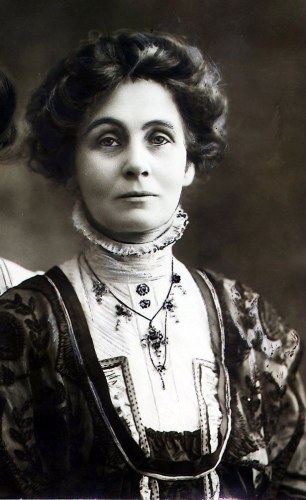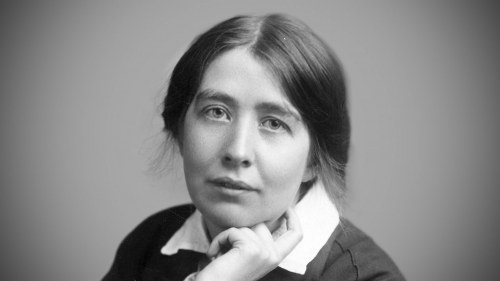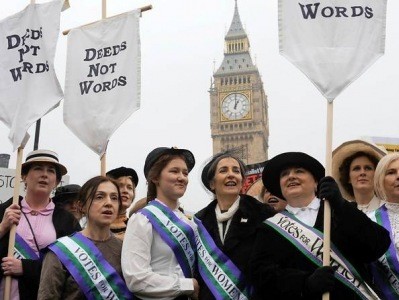You may recall seeing during the Olympic Opening Ceremony’s Danny Boyles’ Green and Pleasant Land and noticing a focus on the Women’s suffragette movement.
Not only were there 50 women replaying the steps and the marches that Emmeline Pankhurst, who was a British political activist and leader of the British suffragette movement which helped women win the right to vote. What many viewers did not know is that her Great Grandaughter was actually playing the roles of Emmeline. Dr Helen Pankhurst is still walking very similar footsteps today to what her Great Grandmother and Grandmother’s beliefs were.
If you watched Mr Selfridge, the hit new Sunday evening drama on ITV (UK National Television) they show how the Suffragettes were seen as a nuisance and to be ignored by the ‘Gentlemen of the time’ It is said that the Selfridges store was one of the only buildings to not have been ‘vandalised’ during the protests in Oxford Street which does show that Mr Selfridge himself was a believer in equal rights among men and women and a great supporter.
 Emmeline Pankhurst
Emmeline Pankhurst
In 1889, Emmeline founded the Women’s Franchise League, which fought to allow married women to vote in local elections. In October 1903, she helped found the more militant Women’s Social and Political Union (WSPU) – an organisation that gained much notoriety for its activities and whose members were the first to be christened ‘suffragettes’. Emmeline’s daughters Christabel and Sylvia were both active in the cause. British politicians, press and public were astonished by the demonstrations, window smashing, arson and hunger strikes of the suffragettes. In 1913, WSPU member Emily Davison was killed when she threw herself under the king’s horse at the Derby as a protest at the government’s continued failure to grant women the right to vote.
Like many suffragettes, Emmeline was arrested on numerous occasions over the next few years and went on hunger strike herself, resulting in violent force-feeding. In 1913, in response to the wave of hunger strikes, the government passed what became known as the ‘Cat and Mouse’ Act. Hunger striking prisoners were released until they grew strong again, and then re-arrested.
“We were called militant, and we were quite willing to accept the name. We were determined to press this question of the enfranchisement of women to the point where we were no longer to be ignored by the politicians.”
She has also been recognised as giving one of the most greatest speeches of the 20th Century – click here

Sylvia Pankhurst
With her mother and sister she had fought for women’s suffrage but Sylvia believed strongly in universal suffrage, feeling that the more participation people had in deciding their own destiny, the sooner they would see a fairer society. However, winning the vote was not enough, and her own work would continue long after that.
After leaving the Women’s Social & Political Union in 1913, Sylvia went to work for the Labour Party, to drum up more support in the East End of London. She also became involved in the international women’s peace movement, bringing warring nations together at an international conference. The International Congress of Women met in the Hague in 1915 to protest against the World War; some 1500 women attended, coming from Europe and the United States. Afterwards, the Women’s Peace Party was formed.
When it came to political lobbying, Sylvia aimed high. George Bernard Shaw wrote of her later, ‘Like Joan of Arc she lectured, talked, won and over-ruled statesmen and prelates. She pooh-poohed the plans of generals leading their troops to victory. She had unbounded and quite unconcealed contempt for official opinion, judgement and authority.’
Sylvia remained active in politics throughout her life, taking on specific causes that moved her including anti-racism. She was, incidentally, the first person in Britain to employ a black journalist. Britain remained suspicious of her, along with many other political figures who had at some time been allied to the Communist Party; in the MI5 Archives is a file dated 1948 discussing strategies for ‘Muzzling the tiresome Miss Sylvia Pankhurst’. Her efforts on behalf of Ethiopia, however, were never forgotten in that country, where she was eventually to spend the last years of her life. Find out more here

Helen Pankhurst
Dr. Helen Pankhurst has extensive experience in international development and campaigning on women’s rights. Helen currently works for CARE International as a Senior Advisor for the Water Team, is also a trustee of Farm Africa and WaterAid, and regularly supports feminist initiatives within the UK.
Previously, Helen was Country Representative for WaterAid in Ethiopia, a country she has a long association with. She also worked as Head of International Programmes at WOMANKIND Worldwide, as the Regional Manager for the Horn of Africa at the Agency for Cooperation and Research in Development (ACORD) and as an auditor with KPMG Peat Marwick.
Helen has a social science PhD from Edinburgh University and also studied at Sussex University and Vassar College. Publications include Gender, Development and Identity: an Ethiopian Study, Zed Books, 1992
Helen is the great-granddaughter of Emmeline Pankhurst and granddaughter of Sylvia Pankhurst, leaders of the Suffragette Movement.
About the author
This article was provided Dr. Helen Pankhurst for International Womens Day.








